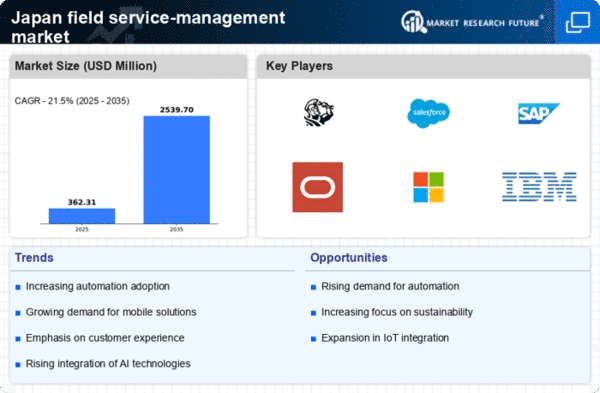Regulatory Compliance and Safety Standards
The field service-management market in Japan is also shaped by stringent regulatory compliance. Additionally, safety standards play a crucial role. Companies are required to adhere to various regulations that govern service operations, particularly in sectors such as utilities and healthcare. Compliance with these regulations not only ensures safety but also enhances operational credibility. Recent statistics indicate that organizations investing in compliance training and safety protocols have reduced incident rates by up to 25%. This focus on regulatory adherence is driving the adoption of field service management solutions that facilitate compliance tracking and reporting. As businesses navigate these regulatory landscapes, the field service-management market is expected to grow, as companies seek solutions that ensure compliance while maintaining operational efficiency.
Rising Competition and Market Consolidation
The field service-management market in Japan is currently characterized by rising competition. Market consolidation is also a significant factor. As more players enter the market, companies are compelled to differentiate themselves through innovative service offerings and competitive pricing. This competitive landscape is leading to strategic partnerships and mergers, as organizations seek to enhance their service capabilities and market reach. Recent trends suggest that approximately 40% of companies are exploring mergers or acquisitions to strengthen their position in the market. This consolidation trend may lead to the emergence of larger, more resourceful entities capable of delivering comprehensive service solutions. Consequently, the field service-management market is poised for growth, as companies adapt to the evolving competitive dynamics.
Growing Demand for Enhanced Customer Experience
In Japan, the field service-management market is increasingly influenced by the growing demand for enhanced customer experience. Customers now expect timely and efficient service, which necessitates a shift in how field service operations are conducted. Companies are focusing on improving communication channels and service transparency to meet these expectations. Data suggests that organizations prioritizing customer experience in their service strategies have seen a 20% increase in customer satisfaction ratings. This shift is prompting businesses to adopt advanced scheduling and dispatching tools, which optimize resource allocation and minimize response times. As customer-centric approaches become more prevalent, the field service-management market is likely to witness significant growth, as companies strive to differentiate themselves through superior service delivery.
Technological Advancements in Field Service Management
The field service-management market in Japan is experiencing a notable transformation. This transformation is due to rapid technological advancements. Innovations such as mobile applications, IoT devices, and cloud computing are enhancing operational efficiency. For instance, the integration of IoT allows real-time monitoring of equipment, which can lead to proactive maintenance and reduced downtime. According to recent data, the adoption of mobile solutions in field service operations has increased by approximately 30% in the last two years. This trend indicates a shift towards more agile and responsive service delivery models, which are essential for meeting customer expectations in a competitive landscape. As companies invest in these technologies, the field service-management market is likely to expand, driven by the need for improved service quality and operational effectiveness.
Increased Investment in Workforce Training and Development
In Japan, the field service-management market is witnessing increased investment in workforce training and development. As the complexity of service operations grows, companies recognize the importance of equipping their workforce with the necessary skills and knowledge. Training programs focused on technical skills, customer service, and the use of advanced technologies are becoming more prevalent. Data indicates that organizations that invest in employee training experience a 15% improvement in service delivery efficiency. This emphasis on workforce development not only enhances service quality but also contributes to employee satisfaction and retention. As companies prioritize skilled labor in their service strategies, the field service-management market is likely to expand, driven by the need for a competent and adaptable workforce.


























Leave a Comment